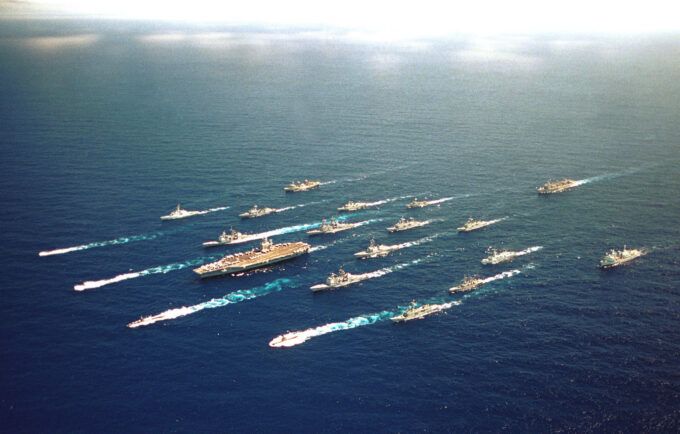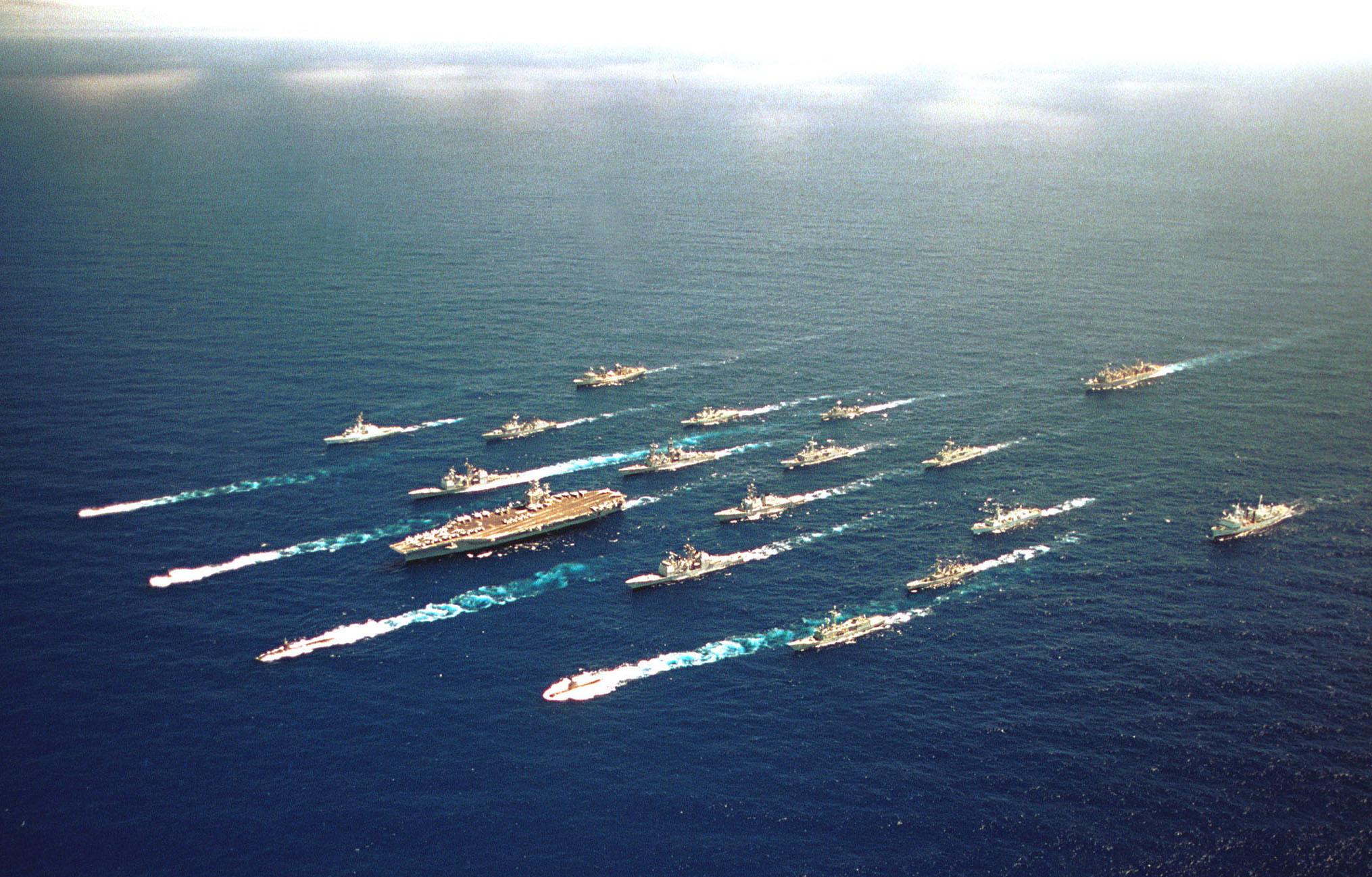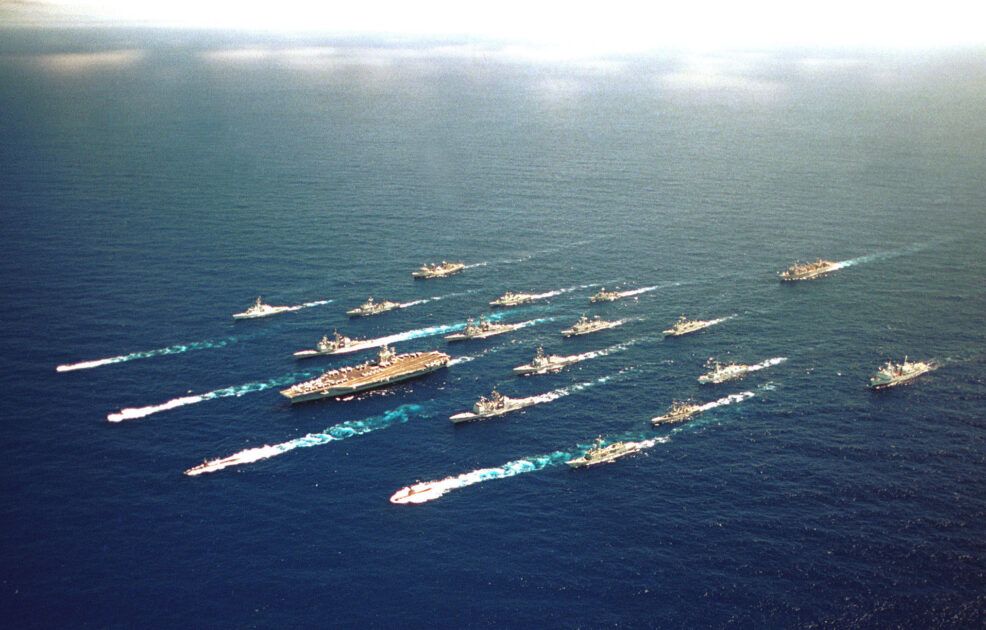
The USS Abraham Lincoln Battle Group off the coast of Hawai’i. Official U.S. Navy photo by: PH2 Gabriel Wilson
The United States is a national security state. Over the past half-century, it has unnecessarily conducted “forever wars” in Vietnam (1960s-1970s), Iraq (2000s-the present), Afghanistan (2000s-2020), and now possibly in Yemen. Not one of these costly ventures has advanced our national security, and—with the exception of Yemen—have been costly in terms of blood and resources. Even the Yemen war is getting costly as well.
The United States is a national security state in terms of defense and intelligence funding, which is equal to the defense spending of the rest of the world combined. Most importantly, only the United States can project power the world over. U.S. air power dominates the global arena, although we are learning that air power is far less powerful than we thought. U.S. sea power is also more formidable than that of any other nation, but has not contributed to any significant military success in these “forever wars.”
Most of our recent presidents have been engaged as commanders-in-chief in managing conflict in the Middle East, the Persian Gulf, and Southwest Asia, although we proclaim that China is the number one security challenge. The military budget continues to climb, and Donald Trump wants to increase the Pentagon budget to more than $1 trillion, while virtually every other aspect of the overall budget faces cost cutting. Our infrastructure is crumbling but funds are not available to remedy the situation, largely due to the bloated defense budget. The Congress has given bipartisan support to increased defense spending, including the modernization of nuclear weapons that have no military utility, and in some cases Congress has allocated more funding than the White House or the Pentagon requested.
We now have two incompetent individuals in charge of the national security community. The first is Marco Rubio, who is secretary of state, acting national security adviser, acting administrator of the Agency for International Development, which now only exists on paper, and acting National Archivist. The Archivist should never be held by a non-professional, particularly a bureaucrat such as Rubio, who will certainly politicize the essential records of the United States regarding diplomacy and international relations.
Rubio’s fealty to Donald Trump has been expressed almost daily, and one of the most stunning examples took place last week. Rubio was asked if the Department of State had been in touch with El Salvador about the release of Abrego Garcia. “I would never tell you that,” Rubio said. “And you know who else I would never tell? A judge. Because the conduct of our foreign policy belongs to the president and the executives branch. Not some judge.”
The only precedent for an individual to be both secretary of state and national security adviser would by Henry A. Kissinger, who held both posts in the 1970s until Gerald Ford became president and his key advisers—Dick Cheney and Donald Rumsfeld—cut him down to size. In any event, Rubio is no Kissinger. As for Mike Waltz, we can only say that he lasted two months longer than the national security adviser in Trump’s first term—Michael Flynn.
Little needs to be said about the other key member of the national security team—Secretary of Defense Pete Hegseth—because it is universally accepted that Hegseth never should have been appointed, let alone confirmed, as secretary. It’s ironic that it was national security adviser Mike Waltz who was fired from his important post and downgraded to UN Ambassador, because it was Hegseth who compromised the security and safety of our fighting forces with his persistent use of insecure lines of communication to discuss sensitive military plans. Senator Richard Blumenthal (D/CT) correctly noted that Waltz became the “fall guy” for the administration’s mistakes on national security, and it was Hegseth who irresponsibly discussed sensitive military plans with communications technology that was easily intercepted.
Since the United States has placed so much importance on the tattoo designs of so-called illegal aliens, perhaps it should be noted that Trump’s candidate to head the National Counterterrorism Center, Joe Kent, has the word “PANZER” tattooed down his left arm, according to Mother Jone’s David Corn. Kent is a white supremacist and has had dealings with a member of the Proud Boys. In Kent’s case, the tattoo does describe the man—a white supremacist.
These personnel moves at the highest level of the national security ladder weaken U.S. credibility and influence abroad, but tell us little about Trump’s real concerns. After all, Waltz has not carried water for Trump over the past three months, and Rubio has spent most of his time cancelling the visas of international students. Meanwhile, Trump has placed the most sensitive foreign policy negotiations on the Russia-Ukraine war, the Israel-Palestine war, and the resumption of the Iran nuclear agreement in the hands of an amateur, Steve Witkoff, a billionaire real estate developer, who has no background or competence in any of these international matters. Witkoff’s few public interviews have revealed a stunning lack of knowledge on sensitive matters, and we’ve learned virtually nothing about Witkoff’s briefings to the president on his talks with global leaders.
In sum, Rubio is now occupying two important positions because he has demonstrated total fealty to the president. However, the national security adviser needs to be at home at the side of the president, while the secretary of state typically needs to be abroad dealing with immediate problems. Rubio certainly cannot do both, and the fact that India and Pakistan may be headed for another war without any involvement from the Department of States indicates the decline of diplomacy in the United States. When these two countries were headed for war in 1999, it was the Department of State that led the way to a diplomatic settlement.
There has never been a president with so little understanding of U.S. national security, and there has never been a national security team with so little competence. U.S. standing in the global arena has declined in terms of influence, credibility, and power unlike any other time in U.S. history. There is no indication that Trump has any understanding of our global security or that Rubio or Hegseth know what to do about it. I see no prospect for turning the corner as long as Donald Trump remains our commander-in-chief, and that the only requirement for participating in his administration is the demonstration of total fealty.
The post Danger: Global Security is Now in the Hands of Trump, Rubio and Hegseth appeared first on CounterPunch.org.



